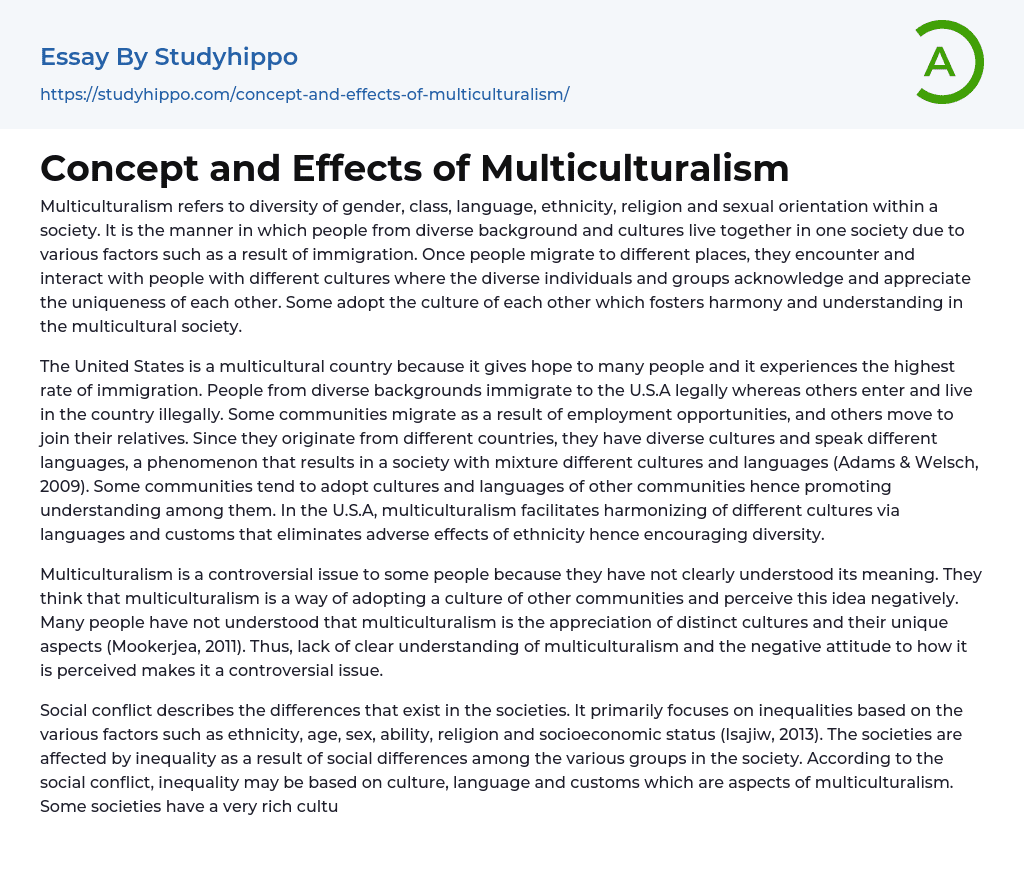Multiculturalism refers to the recognition and acceptance of various forms of diversity within a society, including differences in gender, social class, language, ethnicity, religion, and sexual orientation. This is particularly important when people from different backgrounds come together in one society due to immigration. As individuals relocate to new areas, they naturally interact with those from diverse cultural backgrounds. Within this multicultural environment, individuals and groups appreciate and respect each other's unique characteristics and perspectives. Some may even embrace aspects of other cultures, promoting harmony and understanding within the multicultural society.
The United States is a multicultural country because of the hope it offers and the significant influx of immigrants. People from different backgrounds come to the U.S.A legally or unlawfully. Some migrate for work opportunities, while others move to be with their families. These individuals bring diverse cultures and languages from var
...ious countries of origin, creating a melting pot society (Adams ; Welsch, 2009).
Multiculturalism is a debated topic as some individuals misunderstand its true meaning. They mistakenly believe that it involves adopting another community's culture, viewing this concept in a negative light. However, multiculturalism actually promotes the appreciation of diverse cultures and their individual characteristics. This phenomenon is prevalent in the United States, where it helps to merge different cultures through languages and customs, fostering understanding and diversity. The positive effects of multiculturalism include the elimination of negative consequences stemming from ethnicity. It encourages communities to embrace other cultures, furthering harmonious relationships (Mookerjea, 2011).
The lack of a clear understanding of multiculturalism and negative perceptions surrounding it lead to controversy. Social conflict refers to the differences that exist in societies, primarily focusing on inequalities related
to ethnicity, age, sex, ability, religion, and socioeconomic status (Isajiw, 2013). Inequality affects societies due to the social differences among various groups within them.
According to the social conflict theory, inequality in a society can stem from disparities in culture, language, and customs, all of which are facets of multiculturalism. In certain societies, some cultural groups may possess a more affluent and sophisticated culture than others. Additionally, different factions within a society may have their own distinct languages and customs that contribute to perpetuating inequality. While some individuals may be bilingual or multilingual and capable of interacting with various groups, others may demonstrate specific ways of demonstrating respect for different cultural groups within the society. Nevertheless, it is crucial to acknowledge and value these inequalities in a multicultural society (Mookerjea, 2011). On the contrary, the structural functionalism perspective perceives society as stable and highlights the diverse mechanisms that aid in maintaining social stability.
According to Isajiw (2013), the social structure plays a critical role in determining stability or instability within a society. It serves to maintain social balance among its members. Therefore, the concept of structural functionalism provides insight into understanding multiculturalism, as it highlights how various social components - religion, education, family, media, and the law - contribute to embracing diversity. Each of these components plays a role in fostering diversity within society. On the other hand, symbolic interactionism focuses on how different groups within society interact based on their unique interpretations of cultural symbols. As a result, different groups possess distinct cultural symbols, including written and spoken language.
Multiculturalism is the outcome of a collective comprehension of cultural symbols, including language, viewpoints, visuals, and stereotypes. This
comprehension holds significance within society and contributes to both diversity and globalization. The United States serves as an exemplar of a nation that embraces multiculturalism due to its diverse population. Social conflict, structural functionalism, and symbolic interaction offer varying perspectives on multiculturalism. Social conflict tackles social disparities, while structural functionalism aims for societal equilibrium. Symbolic interaction delves into how individuals from different backgrounds interact by interpreting cultural symbols. Overall, multiculturalism plays a critical role in fostering societal unity.
References
- Adams, J.Q., & Welsch, J.R. (2009). Multiculturalism: The Manifest Destiny of the U.S.A.: An Interview With Ronald Takaki. Multicultural Perspectives, 11(4), 227-231. doi:10.1080/15210960903475522.
- Isajiw, W.W. (2013). Causation and Functionalism in Sociology.
Hoboken: Routledge.
- American Culture essays
- Car Culture essays
- Cultural Differences essays
- Culture Shock essays
- Different Cultures essays
- Indian Culture essays
- Mexican Culture essays
- Mormon essays
- Pop Culture essays
- Popular Culture essays
- Ageism essays
- Cultural Diversity essays
- Discrimination essays
- Diversity essays
- Gender Discrimination essays
- Multiculturalism essays
- Oppression essays
- Peer Pressure essays
- Racial Profiling essays
- Sexism essays




